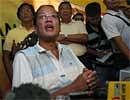

Forty million Filipinos are expected to turn up at polling stations across the sprawling archipelago to elect a successor to President Gloria Arroyo, whose near decade-long rule has been tarnished by allegations of corruption. "The dawn is near... the people are hungry for a new leadership," Aquino, a 50-year-old bachelor, told supporters in his final major campaign rally in Manila ahead of the election.
Polls opened at 7:00 am (2300 GMT Sunday) and were due to close at 6:00 pm, with a winner potentially to be known by late in the evening. Queues formed at many polling stations before the opening and 80 per cent of the eligible voting population were expected to turn out, highlighting the importance Filipinos place in their democracy.
Aquino's main rivals are former president Joseph Estrada, 73, and property magnate Manny Villar, 60.
Two major independent surveys gave Aquino voter support of between 39 and 42 percent, a two-to-one lead over his challengers that places him on course for the biggest win in Philippine election history. The frontrunner is the only son of former president Corazon Aquino and her assassinated husband, Benigno "Ninoy" Aquino, who are revered by many for spearheading the restoration of Philippine democracy in the 1980s.
However, the Philippines' tumultuous brand of democracy is capable of delivering all manner of surprises, and Aquino's win is no certainty. Villar is counting on a nationwide political machinery to help him pull off a shock win, while former movie star Estrada retains strong support among the poor even after he was deposed as president in 2001 for being corrupt.
There are also fears a quick result could be jeopardised by cheating or technological problems. The Philippines is using computers for the first time to tally the votes in a bid to minimise the risk of cheating and to quicken the counting process that took weeks when done manually.
But glitches discovered in the week before the election -- memory cards to be used in the computers were found to be configured incorrectly -- fuelled fears about the credibility of the vote. Election officials insisted yesterday they had been able to replace enough of the memory cards to ensure the vote could go ahead.